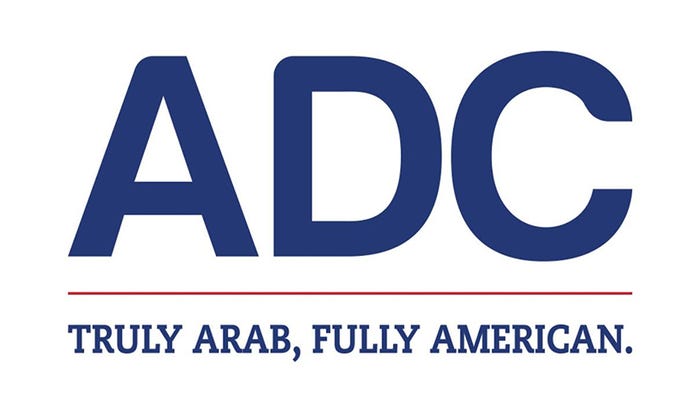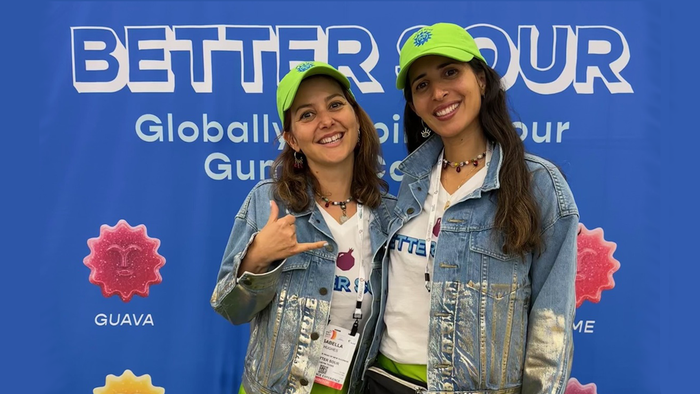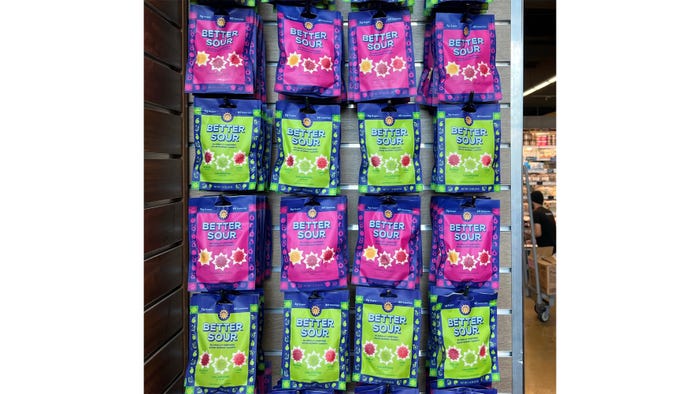ADC launches minority certification for MENA-owned businesses
New initiative supports CPG founders of Middle Eastern or North African heritage in opening retailers' doors and putting products on shelf. Learn more.
August 30, 2023

After about a year of dedicated research and preparation, the American-Arab Anti-Discrimination Committee (ADC) has launched its Minority Business Certification Program. And the creator and the founders of the first two certified companies all hail the program as groundbreaking, long overdue and a landmark achievement.
ADC's Minority Certification marks the first of its kind for businesses owned by Arab, Middle East and North African (MENA) people in the U.S., providing access and benefits that other underrepresented groups—for example, women and Hispanics—have been able to take advantage of for some time now.
Zesty Z and Better Sour stand out as the first two businesses to earn ADC Minority Certification. They just happen to operate in natural foods, even though the initiative applies to any kind of Arab- or MENA-owned business.
As for why ADC sought to certify Arab- and MENA-owned companies, the reasons boil down to many, though not all, of the same reasons other groups undertake similar efforts: namely, to give members a better chance at gaining visibility and economic traction. While women and Native Americans, along with Black, Hispanic, LGTBQ and other historically underrepresented groups, have certification programs, the Arab and MENA community did not until July, that is.
And given the opportunities American Arab and MENA business owners have missed out on, largely due to discrimination stemming from the events of Sept. 11, 2001, ADC, Zesty Z and Better Sour are optimistic the new initiative will help turn the tide.

Bringing ADC certification to life
ADC and its national executive director, Abed Ayoub, have had this type of certification in mind for a while. The time to do it looked promising around 2010, when the Obama administration supported adding MENA as a census category.
At first, ADC thought about gearing certification toward Arab-owned businesses, Ayoub says. But after considering that the U.S. Census Bureau might include MENA as its own category and talking with a range of business owners, the organizers began fine-tuning the program and making it more inclusive, he says.
The point about the census is important. That's because government organizations and private firms often use "race data in planning and funding government programs that provide funds or services for specific groups," the U.S. Census Bureau notes. Having a separate demographic would have removed MENA citizens from being counted as white and opened doors for business owners who would be eligible for special programs.
"We are not Caucasian," says Alex Harik, co-founder and CEO of Zesty Z. "We don't identify with Caucasian, despite the federal government's designation."
But the Obama administration made little headway on adding the MENA category to the census, and the Trump administration did not pick up the ball. The Biden administration wants to add a MENA category, but its proposal, as with any bureaucratic effort, is moving slowly.
Doing the homework, starting with CPG
So, ADC took matters into its own hands. The organization spent the better part of the past year researching and gathering information. That entailed talking with a number of other minority certification bodies to understand, and follow, industry standards for requirements and expected outcomes.
And given his work in CPG, Harik offered his insights so the CPG sector would benefit just as much from the certification. Ayoub, a civil rights attorney, was not familiar with CPG's unique issues, such as slotting fees, discounts and distributors' diversity programs. Harik provided much of the knowledge that helped ADC ensure its minority certification bolsters Arab and MENA members in CPG, as well as other domains.
"The reason why I pushed a bit to start with food is because we could quantify in dollars how much was saved," Harik says. "For example, a slotting fee at a grocery store for one SKU is $10,000. If you have a diversity certification, they wipe that off. So immediately, if you're going into Kroger, just one brand could save, if they have three SKUs, $30,000."

The 'profound impact' of discrimination
For Harik, sharing expertise with ADC struck him as paramount. The need to do so became particularly pronounced as he watched how recent societal events, from the killing of George Floyd to the panic around COVID-19, spurred many people to harass or hurt Black and Asian Americans, for example.
"I saw that, and I didn't like that," Harik says. "And I started thinking, 'Well, we're a group that has been underserved in the post-9/11 world. We have been targeted just as much as these people."
Ayoub agrees. "Discrimination has a real, profound impact on the economy," he says.
Discrimination also comes in the form of fewer funding opportunities, a trend that ADC Minority Certification seeks to reverse. Such official recognition opens the door for businesses to compete for government and private contracts, for example. To ensure its certified constituents receive the same chances at contracts, discounts, training, funding and so on, ADC made sure to follow the same standards other certification programs require.
Better Sour co-founders Bella Hughes and Semira Nikou have also observed the negative impact of such inequities.
"We know from the studies that the ADC, the National Iranian American Council and others have done, MENA Americans do face a range of discrimination in work, housing and elsewhere," Nikou says.
For Hughes and Nikou, who are both of Iranian heritage, the entrepreneur experience has been a bit different than it has for many of their peers because they were able to secure the Women's Business Enterprise National Council certification. That gave them access to a range of support programs many Arab and MENA owners could not get before ADC—and that vexed Hughes. She previously co-founded and operated Shaka Tea with her husband, Harrison Rice, until they sold it to King's Hawaiian in February 2022.
"As a matter of principle, it's been frustrating to see that MENA founders—all the way from Afghanistan to Morocco—have been excluded from DEI initiatives," she says. "And because, until now, there has been no way to identify MENA-owned brands, we don't have proper data on the various ways that MENA founders are contributing to CPG. Meanwhile, we know anecdotally that they're doing amazing things."
With the ADC Minority Certification, however, those frustrations look to turn into positive action. Regarding the certification proceedings, interested parties have to verify their parents' heritage as Arabic or MENA. They must further provide a range of business documents, including proof that the Arab or MENA owner is involved in the day-to-day operations. And they undergo various interviews with ADC. The entire cycle lasts two to three weeks.
Lowering costs, opening doors, encouraging others
Given Harik's involvement with ADC's certification work, Zesty Z was the obvious choice as the first company to pursue accreditation. And that designation has immediately increased Harik's chances of getting his products into major retailers.
That's vital for ADC-certified companies to keep in mind, Harik says. Being able to quantify how much money the certified Arab and MENA CPG community saves in slotting fees alone will speak volumes regarding the progress of diversity initiatives.
"This will lower the costs, open doors and encourage others to start a business," Harik says. "Entrepreneurship is the American dream, so to be able to contribute to that in some way is powerful."
Better Sour is the second MENA business to get ADC certified. Hughes and Nikou met Harik earlier this year. He introduced them to Ayoub, in a series of events that led to Better Sour gaining its certification in July.
"I'm so happy to finally have this MENA CPG founder community and, hopefully, increased conversations and inclusion in the industry for MENA folks," Hughes says. "It's important to include and celebrate the vibrant MENA community and our diverse cultures and experiences. I also hope that retailers will start recognizing this certification as part of their commitment to diversity and leveling out the playing field, especially for early-stage brands."
Nikou also looks forward to the possibilities that will come of the certification.
"If only 12-year-old me eating her 'weird' food at the school cafeteria could take a peek ahead," Nikou says. "I feel immense pride and a deep sense of excitement knowing that we're on the precipice of a historic shift in how we view food culture and inclusion in America.”
MENA Americans “come from such beautiful, delicious and incredibly diverse food traditions shaped by thousands of years of global trade and cultural exchange,” Nikou continues. “Now there is a way for the MENA community's impact on the CPG scene to be captured and properly credited. Hopefully, retailers and the broader CPG community will expand their DEI initiative to help us get our stories heard."
Ayoub agrees. "We're not going to let anybody else dictate the terms of what MENA is or how our businesses are defined as MENA owned," he says. "We know our own experiences. We know what we've all gone through, what our families went through, and we can incorporate that into the guidelines and into the processes that we're moving forward with, and that's really exciting."

Focusing on empowerment, not cultural appropriation
Foods of Arabic and MENA heritage have soared in popularity in the U.S. in recent years. Accordingly, more American brands without genuine ties to Arabic or Middle Eastern countries have introduced products that have, well, bastardized these foods for the American palate. One example Ayoub and Harik mention is chocolate hummus.
"That's a little offensive, right?" Ayoub says.
But, he adds, ADC and its Arab and MENA members can't spend their time worrying about cultural appropriation.
"The appropriations of foods and whatnot, that's going to continue to happen," he says. "You've got to focus on your product and the services you're providing. It's not just in the food industry. It's in the legal field. It's in the tech field. It's everywhere. We have to focus on elevating our own and giving our own the tools they need and not fight these other little battles, trying to put these little fires out that are going to deter from the objective.”
Harik agrees: "We want to bring people into the culture and that's how we will elevate awareness and combat appropriation."
Hughes and Nikou also prefer to spend their energy building Better Sour and supporting their peers.
"Frankly, we don't think that the central purpose of this certification is about gatekeeping," they told New Hope Network in a joint statement. "The issue of appropriation is a challenging, nuanced and often case-specific one. For us, what's most exciting about the certification is that it'll allow for the identification of and data gathering on MENA-owned brands, as well as encouraging retailers to expand their DEI initiatives."
And for Ayoub, the momentum is only just beginning. As he fields more and more certification applications, he sees the ADC program as historic.
"The success of the community, the success of our businesses and our endeavors empowers all of us,” he says. “But for me, really, the great thing right now is being part of something so early on that's going to grow through the years. And we're setting the precedent for a program and a benefit that's going to be used by tens of thousands of individuals by the time we get to 2030."
Read more about:
J.E.D.I.About the Author(s)
You May Also Like




